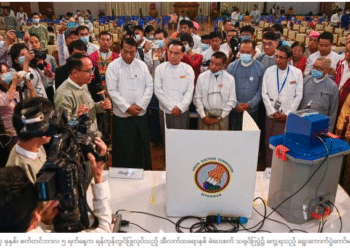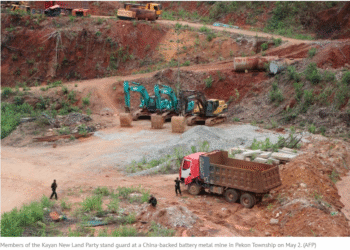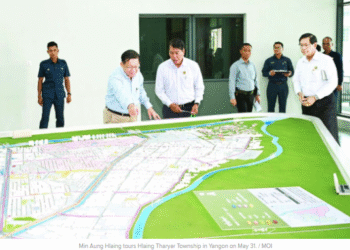By FRONTIER
With night falling at the Aung Mingalar highway bus station in the northern outskirts of Yangon, Ma Maw Hlaing* divided the last of some steamed corn between her two hungry children. Having not eaten herself all day, she began to tell her story.
They came from a village in Magway Region’s war-torn Pauk Township, she said, where fighting was intensifying between the military and People’s Defence Forces. Her husband had died from illness three years ago, and she was in desperate need of work, so she contacted a broker who said she would help her find a job in Myanmar’s commercial capital.
“I used to work in the paddy fields. But the fighting made it too dangerous, and it was so hard to make ends meet. When the broker asked if I wanted to work in Yangon, I agreed. I had no one to take care of my children so I brought them with me,” the 33-year-old mother told Frontier on February 16.
The broker promised Maw Hlaing a factory job and a cheap hostel room to rent nearby. She borrowed K500,000 (US$240) from a money lender and travelled to Yangon with her children and the broker.
But just two days later, she and the children were abandoned, penniless.
“I believed the broker because an acquaintance introduced her to me. When we arrived in Yangon, she left us at another broker’s house. The second broker asked me for money to find the job and a room for us. So, I gave everything I had,” she said.
The second broker left her by the side of the road in Mayangone Township, saying he would look for rooms nearby, but never came back.
Maw Hlaing had never been to Yangon before and didn’t even know where she was. A street vendor listened to her plight and showed her the way to the highway bus station to return to where she came from.
“I had to sleep here at the station, and people have given us a little money to go back to our village. I feel like a complete beggar. But there’s no point in feeling shame; I have to stand up for my children. Those brokers stole everything, my dignity too,” Maw Hlaing said, wiping away tears.
Before boarding the bus to Pakokku, she said she would stay with a relative in the Magway Region town and run errands for better-off families to repay her loan. After her ordeal, she said she will never dream again about working in the big city.
Conflict and economic woes
Maw Hlaing is just one of many thousands driven from their rural homes by conflict and deepening poverty and lured to cities by the promise of safety and work.
The World Bank estimates that poverty levels in Myanmar have doubled in less than three years, with around 40 percent of the population living below the poverty line. “Nearly a decade of progress on poverty reduction has been undone,” it said in a report in September last year.
Rural communities hosting armed resistance groups, especially in Sagaing and Magway regions, are facing increasingly brutal military offensives. The United Nations estimates 1.1 million people have fled their homes since the February 2021 coup.
“Many people are moving around because of the war. People had to flee and try to survive in the towns and cities because their villages were set on fire or shelled,” said Nang Moet Moet, general secretary for the Women’s League of Burma.
This shift has been accompanied by a serious erosion of labour rights in urban areas since the military takeover, the International Labour Organization says. Many organisations and law firms that provided assistance to vulnerable workers before the coup, like the WLB, have either been banned or forced to operate underground to avoid crackdowns.
The WLB, a coalition of 13 women’s organisations from various ethnic backgrounds, is still trying to help people in conflict zones but its resources are limited.
“Even in Yangon and Mandalay, the two biggest cities in Myanmar, peace and security aren’t guaranteed for people,” Moet Moet said. “Employment opportunities are also grim. Myanmar is now an extremely poor country where jobs are scarce.”
The military takeover and the junta’s erratic fiscal policies sent the economy into a tailspin, and while it has since managed to stop the freefall, the situation remains dire for many. The Myanmar kyat has fallen by about 50pc against the US dollar over two years, the World Bank said in January, while inflation was running at about 20pc last year.
U Kyaw Ni, deputy labour minister in the parallel National Unity Government, said worsening insecurity and livelihood opportunities since the coup have pushed an increasing number of workers to leave the country, which also leaves them vulnerable to exploitation. The ILO estimates some 10pc of the Myanmar workforce is abroad.
“In places where there is fierce fighting, people can hardly work. When they flee conflict, they lose almost all their possessions,” Kyaw Ni told Frontier. “Those who cannot pay agents or find a way to work abroad have to seek jobs in the nearest cities. It will only get worse until the revolution is over,” he said.
But as Maw Hlaing discovered, this flow of internal migrants to urban areas, competing for too few jobs amid bureaucratic barriers and delays, is filling the pockets of unscrupulous brokers who scam rural people out of their meagre savings with the promise of easy employment.
Ma May Kyi*, 30, was a tailor in her village in Sagaing Region’s Ye-U Township, but military operations repeatedly forced the local population to evacuate, making stable work impossible.
She joined a job search group on Facebook where she made contact with an agency that promised to arrange interviews in Yangon. Persuaded, May Kyi left her family and stayed at a women’s hostel in the sprawling suburb of Hlaing Tharyar, home to many factories but also known as a crime hotspot.
“The agency arranged interviews for me but I had to pay K10,000 for each one. I thought that I would get a job quickly, but I was wrong. I was there for one month and got four interviews, but no one called me. My money was running out because of living costs and agency fees,” she said.
May Kyi eventually came to suspect that these interviews were fake.
“They didn’t tell me clearly the names of companies interviewing me. Sometimes they did interviews online and at teashops. I found out when my roommates warned me. When I questioned the agency, they got angry, cursed me and hung up the phone,” she said.
May Kyi is not giving up though, and is still looking for work in garment factories through her roommates.
“I have to keep trying because I can’t go back to my village. Clashes keep breaking out and there is no work,” she said.
Breakdown in support
Daw Myo Myo Aye, leader of the Solidarity Trade Union of Myanmar, told Frontier that some rural people were easy prey for scammers, because they are less educated and less familiar with the dangers of social media.
“They believe someone easily because they don’t have enough information. Although many people use the internet with mobile phones, most just use it for entertainment and fun, not to gain knowledge or to learn new skills,” she said.
The junta declared the STUM unlawful shortly after the coup and Myo Myo Aye was jailed for six months, but the group continues trying to quietly help workers through its networks. Myo Myo Aye said helping scam victims is particularly difficult, as is tracking down the culprits.
“We are helping them because we are a labour organisation, but sometimes the ignorance of workers is frustrating. They can’t even tell who the scammers are, and how can we reach them? Most are simple people from rural areas, and that’s why they are targeted,” she said.
U Ye Naing Win, secretary general of the Cooperation Committee of Trade Unions, also banned by the regime, said brokers were profiting from falling demand by employers for labour, and that senior workers were also abusing their positions.
“We have never heard before of workers demanding money from other workers. Now some supervisors or foremen already employed in a factory demand money from newcomers who want jobs. The [newcomers] have to pay around K50,000 to their superiors to get positions,” he said.
The WLB’s Moet Moet said that besides desperation for jobs, the post-coup collapse in the rule of law allows many forms of fraud, exploitation and violence against migrants to thrive.
“They know that even if they exploit others, no one will take action against them,” she said of employers and recruiters. “Instead of helping each other out, some are taking advantage of others. Now that the military is ruling, there will be no justice.”
Sixteen-year-old Ma Zar Chi left her village in Ayeyarwady Region to work as a housemaid in Yangon six months ago. The eldest child with three younger siblings, it fell on her to help support the family.
“My father’s income on its own can’t feed the whole family and my mother is always busy with the little ones,” she said.
Through a broker, she got a job at a home in Hlaing Township, where she was paid K130,000 ($62) a month, a pittance for the amount of work she had to do.
“I worked for everyone in the family – five members including two sick elderly people and one three-year-old kid. I had to cook, clean, babysit and take care of the old ones. I could only sleep about four hours a day,” she said.
When the work became too much and she decided to quit, she said the broker and family conspired to hold her against her will. She accused the family of stealing her national ID card to prevent her from leaving, but she fled anyway, escaping one day while taking out the waste. Once out the house, she scrimped together her meagre savings to buy a bus ticket.
“I carried my fear home,” she said.
Like many others, Zar Chi knew she was being abused but hadn’t known where to turn to for help.
“We have no choice but to stay quiet and suffer whatever the employer does to us. If we don’t like it, all we can do is try to get out. There is no right to seek justice for us.”
Union activist Ye Naing Win said female workers are particularly vulnerable.
“Over 80pc of garment workers are female, and many internal migrants are women. We need to provide a stable working environment for them. If not, some might take risks, for instance by becoming sex workers,” he said.
Frontier has reported a growing number of women turning to sex work, where they struggle for income and face assault and extortion by criminal gangs.
Kyaw Ni, from the NUG, said victims can report scams to the parallel government’s labour ministry or file a complaint with its Ministry of Home Affairs. But internal migrants don’t seem to be using these mechanisms, either because they don’t know about them, or because they don’t believe the NUG can deliver justice in cities like Yangon and Mandalay, where the military remains in control.
“We welcome complaints. Although we’ve seen some scams involving external migrants, we haven’t seen as many involving internal migrants,” Kyaw Ni said.
Ye Naing Win also said the legal assistance groups that operated before the coup have stopped working or fled the country because of the junta’s crackdowns.
“There is a big hole in the help available to workers. Law firms were common before and it was easy to file a complaint. Now everything has changed,” he said.
Moet Moet said groups that remain active must cooperate with the junta, and therefore are no longer effective at addressing human rights concerns. Frontier contacted three law firms that are still legally operating and used to help exploited workers and vulnerable women before the coup. All declined to be interviewed.
According to Moet Moet, the number of women requesting help from the WLB has surged in the past two years, but with most of its members in hiding, the group can only respond to a fraction of the requests.
“We ourselves are in a situation where we need a lot of help. So, the people who face huge human rights violations on the ground are now totally helpless. There’s nothing left for them to rely on,” she said.
Credit – https://www.frontiermyanmar.net/en/exploitation-and-abuse-await-rural-migrants-pouring-into-cities/






